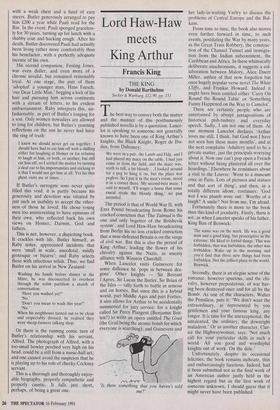Lord Haw-Haw meets King Arthur
Francis King
THE KING The best way to convey both the matter and the manner of this posthumously published novella is by a quotation. Lance- lot is speaking to someone not generally known to have been one of King Arthur's knights, the Black Knight, Roger de lba- dan, from Dahomey: We were in a pub, the Lamb and FlIg, and I had placed my mace on the table. I had just come in from the field, and the mace was, truth to tell, a bit bloody. ... I looked around for a peg to hang it on, but the place was pegless. So I put it in the men's room, stood it in a corner there. My second-best mace. I said to myself, 'I'll wager a horse that some rascal steals the bloody thing,' no pun intended.
The period is that of World War II, with Ezra Pound broadcasting from Rome his cracked conviction that 'The Talmud is the one and only begetter of the Bolshevik system', and Lord Haw-Haw broadcasting from Berlin his no less cracked conviction that a near-defeated Britain is on the verge of civil war. But this is also the period of King Arthur, leading the flower of his chivalry against the Nazis, in uneasy alliance with Winston Churchill.
When Lancelot visits Guinevere for some dalliance he `pops in between dra- gons'. Other knights — Sir Berrant l'Apres, Sir Lucan the Butler, Sir Brian of the Isles — sally forth to battle in armour and on horses. But since this is a hybrid world, part Middle Ages and part Forties, it also allows for Arthur to be accidentally summoned for jury service; for a knight called Sir Percy Plangent (Benjamin Brit- ten?) to write an opera entitled The Grail (the Grail being the atomic bomb for which everyone is searching); and Guinevere and Is there something that you haven't told me?' her lady-in-waiting. Varley to discuss the problems of Central Europe and the Bal- kans.
From time to time, the book also moves even further forward in time, to such events, postdating the War by many years, as the Great Train Robbery, the construc- tion of the Channel Tunnel and immigra- tion from the Indian subcontinent, the Caribbean and Africa. In these whimsically deliberate anachronisms, it suggests a col- laboration between Malory, Alice Duerr Miller, author of that now forgotten but once hugely popular verse novel The White Cliffs, and Frankie Howard. Indeed it might have been entitled either `Carry On Round the Round Table' or `Something Funny Happened on the Way to Camelot'.
There are certainly people who are entertained by abrupt juxtapositions of historical pish-tushery and everyday speech. Sadly, I am not one of them. At one moment Lancelot declares 'Arthur loves me still, I think, but God wot I have not seen him these many months', and at the next complains `Adultery used to be a private matter, just the principals worrying about it. Now one can't pop open a French letter without being plastered all over the hoardings.' Elsewhere he reminisces about a visit to the Louvre: `Went to a museum once in Paris. Lots of pictures and statues and that sort of thing', and then, in a totally different idiom, continues: `God wot I was plumb wore out.' Worthy of a laugh? A smile? Not from me, I'm afraid.
Fortunately there is more to the book than this kind of jocularity. Firstly, there is wit, as when Lancelot speaks of his father, King Ban of Benwick:
The name was on the mark. He was a good man and a good king, but proscriptive in the extreme. He liked to forbid things. This was forbidden, that was forbidden, the other was forbidden. Wake up in the morning and you'd find that three new things had been forbidden. Not the jolliest place in the world, Benwick.
Secondly, there is an elegiac sense of the romance, however spurious, and the chi- valry, however preposterous, of war hav- ing been destroyed once and for all by the Bomb. As one of the characters, Walter the Penniless, puts it: 'We don't want the extraordinary, as represented by you gentlemen and your famous king, any longer. It is time for the unexceptional, the untalented, the ordinary, the downright maladroit.' Or as another character, Clar- ice the Highwaywoman, says: 'Not much call for your particular skills in such a world. All you good and worshipful knights out of work. On the dole.'
Unfortunately, despite its occasional felicities, the book remains inchoate, thin and embarrassingly facetious. Indeed, had it been submitted not as the final work of an American author justly held in the highest regard but as the first work of someone unknown, I should guess that it might never have been published.


















































 Previous page
Previous page